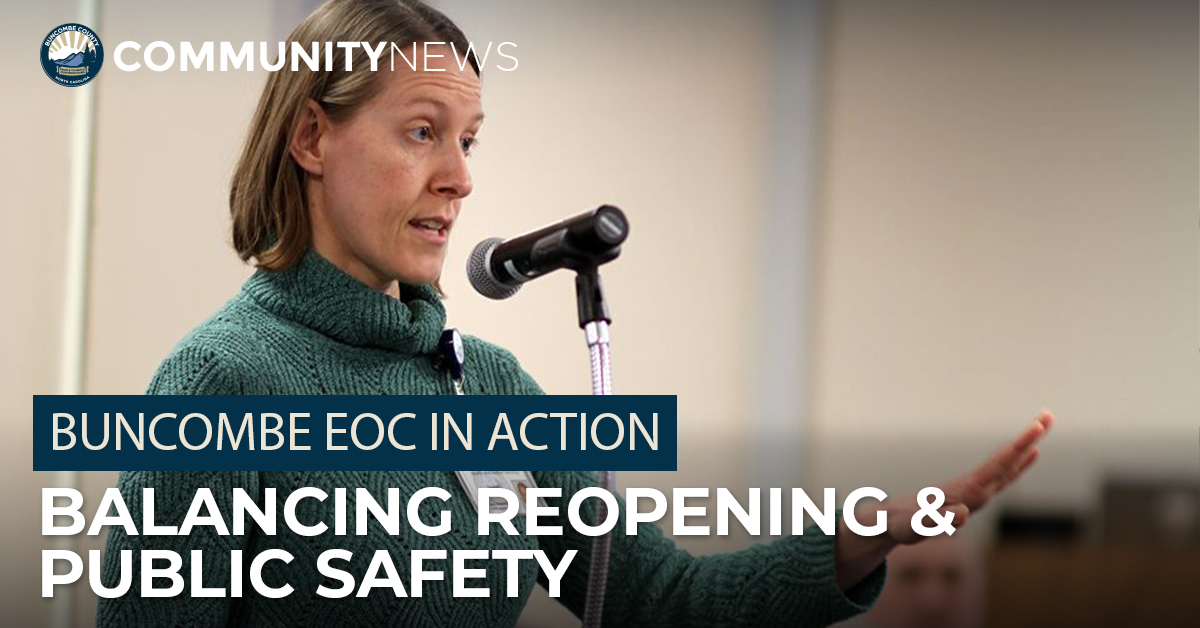This news item expired on Monday, March 15, 2021 so the information below could be outdated or incorrect.

This is the sixth article in a series where we look at the diverse methods our EOC is using to meet real needs related to the COVID-19 pandemic. You can find the previous installments below.
Since news of the COVID-19 outbreak, Buncombe County officials have taken guidance from experts in the medical and scientific communities and treated this as a public health crisis. On March 12, Buncombe County proactively declared a state of emergency and put weeks’ worth of logistical planning into action by opening its emergency operations center (EOC). Since then, a collaboration of governments, nonprofits, school systems, and other stakeholders have been diligently and innovatively looking at ways to address myriad community needs stemming from COVID-19.
Below are some of the resources our EOC has developed and ways you can learn more about those programs.
Phasing in economic activity while monitoring COVID-19
On May, 8, Buncombe County entered into its first phase of reopening. This decision was informed by our experts in the health and emergency services fields who understand we are balancing economic disruption and public safety. “We understand we have to make moves to reopen our community, but we can do it methodically and give ourselves the opportunity to catch early indications of COVID-19 surges or other issues,” explains Emergency Preparedness Director Fletcher Tove.
Numerous voices from the EOC have weighed in on when and how to reopen, what metrics to keep an eye on as the disease continues to spread, and how to respond to a potential outbreak. Listening to feedback from the business community was an essential part of this process, and the EOC has had constant contact via weekly conference calls. “There is still a very real possibility of COVID-19 overwhelming our health care system,” notes Tove. “Locally, we‘ve been proactive and tamped down on the initial surge. But, as we loosen restrictions, we know we will see more cases and the goal is controlling the rate of spread.” Buncombe County’s relatively low case count and slowed curve show favorable outbreak trends that give us cautious optimism to gradually ramp up economic activity.
Of course, Buncombe County faces a unique challenge with its popularity as a nationally acclaimed tourist destination. EOC members discussed preventative measures to help mitigate a surge of cases from potentially contagious visitors. To that end, the EOC deemed it appropriate to keep restrictions on hotel rooms and short-term rentals to minimize people from outside Western North Carolina visiting and potentially acting as a catalyst for a COVID-19 outbreak. However, EOC members noted the low outbreak trends across our region and deemed it appropriate to allow residents in the nearly 9,000 square-mile span of the 828 area code to book overnight stays to help generate more spending in our local economy.
As far as moving forward, the EOC remains cautiously optimistic and is very closely monitoring case counts and other important indicators of a potential increase in cases. “Governor Roy Cooper’s current phase one order is set to expire May 22, but we can’t take anything for granted. Governor Cooper and his team are watching statewide data and planning for the next phases, we don’t have specific details, but we are hard at work,” explains Tove. In the meantime, the EOC continues to partner with community organizations to host town hall sessions for impacted businesses to provide guidance and share ideas to further economic activity while safeguarding the health of our community.
For additional information and resources on Buncombe County’s phase one, click here.
Previous EOC in Action articles